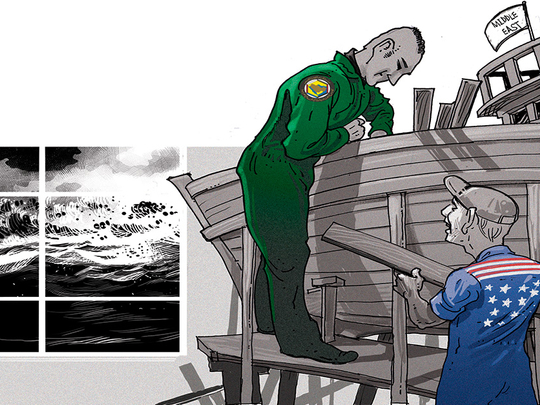
This week’s GCC Consultative Summit in Riyadh focused on the threat to the region from Iran and the crisis in Yemen, but it also helped set the Arab agenda for the upcoming GCC summit with US President Barack Obama on May 13-14 at the White House and in Camp David.
Top of the agenda in Washington will be Iran, and the ongoing military actions in Yemen, Iraq and Syria, which require the American leadership to work with the GCC and Arab positions. Without greater clarity on the military options and the political endgames, there is a danger that these wars could continue for a very long time.
The long-term issue at the US-GCC summit will be how the Americans can work with the Gulf states to support stable and rational governments across the region. This will include both the defeat of extremism, but also the nurturing of restored national governments. GCC leaders will face an uphill battle to try to re-engage the US in the wider task given its incoherent responses between Iraq (modest), Syria (minimal) and Libya (nothing).
Both the GCC and the US agree on the need to utterly defeating Daesh, and some GCC members are active members of the coalition in Iraq, while others are in a different alliance against Daesh in Syria. From both a military and political perspective, it would be good for the US-GCC summit to try to bring these two alliances closer together so that Daesh can be opposed more effectively.
But the solution to the Middle East’s problems is not purely military. The region needs stable governments, rule of law, and leaders seeking to nurture their people’s prosperity. Gulf leaders will need to convince the Americans to be more aware of the need to encourage good governance than run drone programmes and hunt Al Qaida cells.
Iran
From the American side, an important strand of the US-GCC summit will be to reassure the Arab leaders that the impending nuclear deal with Iran will not harm the US-Arab relationship.
The Arabs will no doubt listen to these assurances but then seek a more active American commitment to resisting Iranian interference in Arab states, quoting the deep Iranian involvement in Iraq and Syria, and its sponsorship of sectarian groups in Lebanon and Yemen, as well as its role in supporting destabilisation in Bahrain.
The White House will be very keen to get GCC backing for the deal, which is seen as a major element of Obama’s legacy. Gulf states may see this an opportunity to seek new weapons systems and security guarantees from the Americans in exchange for backing the deal. Saudi King Salman Bin Abdul Aziz used the GCC’s summit in Riyadh this week to launch a centre to coordinate humanitarian assistance for Yemen, and invited the United Nations to join the relief work for Yemen. This was an important part of widening the work of the Saudi-led coalition to support the non-military aid that Yemen desperately needs.
Nonetheless, King Salman combined his recognition that Yemen needs help with a strong reaffirmation that the GCC had to intervene in Yemen “to halt the complete collapse of Yemen”. On April 22, the coalition ended Operation Storm of Resolve, which was purely military, to be immediately replaced by Operation Restore Hope, which included a plan for a political settlement as a final outcome.
King Salman also told the GCC summit that the coup leaders in Yemen had rejected the GCC initiative to bring an end to the chaos, with the implication that the fighting must continue for some time. The king reaffirmed Saudi Arabia and its coalition partners’ commitment to support Yemen by all means possible.
His Highness Shaikh Mohammad Bin Zayed Al Nahyan, Crown Prince of Abu Dhabi and Deputy Supreme Commander of the UAE Armed Forces, said this week in Abu Dhabi that the UAE’s participation in military action in Iraq, Syria and Yemen is “a translation of the principles of our foreign policy, which is based on fairness and aims at guaranteeing the security and stability of the member states of the GCC, inspired by the charters of the United Nations and the Arab League as well as the rules of international law.”
White House
In order to prepare the way for the Washington summit, US Secretary of State John Kerry rushed to Riyadh after the GCC’s consultative summit was over, and his visit coincided with Saudi Arabia’s hosting a meeting of Syrian opposition groups. In the furore over Yemen and fighting Daesh in Iraq and Syria, the Syrian civil war has slipped below the radar.
But it continues with murderous intensity and little sign of stopping, and has caused the largest ever humanitarian crisis.
The three-way struggle has been dominated by the government and extremist forces, and Saudi Arabia and Qatar have been helping the US prepare the secular opposition to take a more successful role. The GCC will want to be to get the secular opposition forces into some kind of balance of power in the fighting that will lead to a successful Geneva conference and a political solution that will have to include the opposition and government, but exclude the extremists.








